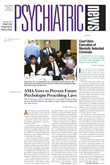Residents who are sexual minorities—that is, gay, lesbian, bisexual, or transgendered—have an extra layer of issues to cope with that can complicate their educational development and add substantial stress to an already stress-laden experience.
Among the most troubling, particularly when they arise in a psychiatric education setting, said Dan Karasic, M.D., are “overt homophobia” on the part of supervisors and other residents, lack of knowledge about sexual-orientation issues on the part of residency supervisors, and a lack of social supports leaving some residents feeling isolated from their colleagues.
Karasic, an associate clinical professor of psychiatry at the University of California, San Francisco (UCSF), and vice president of the Association of Gay and Lesbian Psychiatrists, chaired a workshop on training challenges faced by gay, lesbian, bisexual, and transgendered (GLBT) psychiatry residents at APA’s 2002 annual meeting in Philadelphia in May. The Northern California Psychiatric Society’s Committee on Gay, Lesbian, Bisexual, and Transgender Issues sponsored the workshop.
While their “visibility and acceptance have increased” at many psychiatry training programs over the last few years, GLBT residents still have to grapple with the complex issue of how, when, and even whether to disclose their sexual orientation to their training director and other residents. The results of such disclosures sometimes cause nothing more than a few ripples, but negative reactions to the news can often lead to disruptions of the trainee’s educational experience.
Creating ‘Safe’ Environment
The problem of residency supervisors who are, or are perceived to be, unreceptive to their gay and lesbian residents goes well beyond the trainee’s emotional reaction to what he or she perceives as rejection or overt bias, noted Ellen Haller, M.D., an adjunct professor of psychiatry at UCSF. When this situation occurs, the supervisor has abdicated his or her responsibility to make the residency experience a “safe” one in which the trainee feels he or she can disclose perceived “mistakes” and learn from them, she said.
A critical role for the training supervisor in psychiatry is to make the residency “a safe place to explore countertransference,” she said. If a gay or lesbian resident senses the environment is unsafe for disclosing his or her sexual orientation or discussing issues related to either the therapist’s or patient’s sexual orientation that may arise during psychotherapy, “it presents a therapist-patient dyad in which the dynamics won’t work,” Haller noted.
It is important, Haller suggested, for beginning psychiatry residents to work with a supervisor who is sensitive to and knowledgeable about GLBT issues. “Having appropriate supervision is really critical,” she stated, “so GLBT residents can be completely open and clear” about what’s going on in their patients’ therapy.
Outreach to Gay Residents
UCSF goes farther than most residency programs in addressing the unique needs of GLBT residents, she pointed out. Every residency applicant invited to an interview receives a letter with information on all minority group organizations available to residents, including membership rosters in some cases. The organization called Q, which is for GLBT residents, lists the names of several “out” faculty members, and the faculty hosts an annual brunch for residents. In addition, UCSF’s psychiatry residency curriculum includes classes on sexual-orientation issues in the PGY-1 and PGY-3 years and offers residency opportunities in HIV psychiatry, she noted. It is one of very few residency programs with a full-time coordinator for LGBT resources and has a Web site at www.ucsf.edu/cge/lgbtr/.
The program also informs its residents that the Northern California Psychiatric Society has a committee that puts on workshops and writes a regular column on GLBT issues in the district branch newsletter, tells them about the existence of the Association of Gay and Lesbian Psychiatrists, and provides information about a referral network for residents who stay in the San Francisco area after graduating.
UCSF psychiatry resident Kristin Riley-Lazo, M.D., emphasized that regardless of a resident’s sexual orientation, it is critical that he or she is aware of LGBT resources in the local community as a service to patients. She also urged residents to think about the issue of when, to benefit a patient’s treatment, it might be appropriate for the resident to disclose his or her sexual orientation.
Haller stressed that there is “a lot more that can be done” by psychiatry training programs to address sexual orientation and sexual-identity issues crucial to LGBT residents and other residents.
Dramatic testimony about what it can be like to be a resident who is a sexual minority came from Melanie Spritz, D.O., an early career psychiatrist in New York City. Spritz is a transgendered psychiatrist who began life as a man and had surgery to become a woman while she was a resident.
She told of being the target of “hatred and ignorance” by staff with whom she has worked and reported that some of her colleagues “made no attempt to empathize or be cautious” when making remarks about her when patients were present. She also told.of receiving death threats on more than one occasion.
Haller stressed that there is “a lot more that can be done” by psychiatry training programs to address sexual orientation and sexual-identity issues crucial to LGBT residents and other residents. ▪
